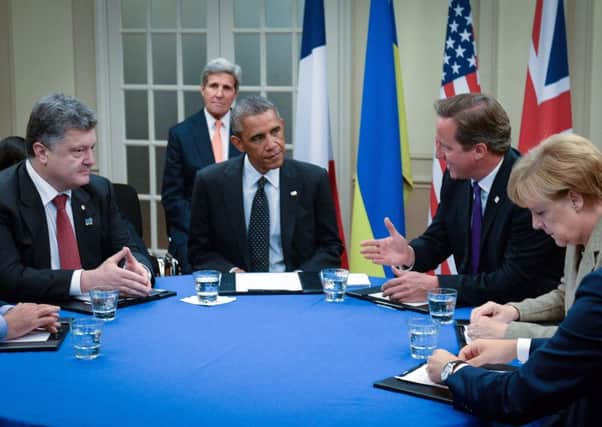Leaders: Nato needs to ask itself some questions


Back in 1997, the final tombstone for the Cold War between Nato states and the USSR was erected in Paris with the signing of the Nato-Russia Founding Act. It aimed for a lasting peace in the Euro-Atlantic area and contained promises to respect the territory of all states within it, including those of the by-then crumbled Warsaw Pact.
Russia’s annexation of Crimea, under the pretext of protecting Russian citizens there, and its continued destabilisation of Ukraine, clearly breaches that agreement. Other former Soviet states with large Russian speaking minorities thanks to the years of Soviet occupation, such as Estonia, Latvia, Lithuania, and Poland, worry that they might be next on Vladimir Putin’s list for similar treatment.
Advertisement
Hide AdAdvertisement
Hide AdVery pointedly, US president Obama has visited Estonia to pledge Nato support should any such threat materialise. American and now European troops are to create a presence on the ground in Poland, Slovenia, Hungary and Romania. This strategy, says Nato, is being completely misunderstood. It is simply about reassuring nervous border countries and deterring any Russian aggression until Russia realises that its best interests are served by pursuing peaceful cooperation.
But viewed from Moscow, it is easy to see why it might be interpreted as a stealthy resurrection of Cold War choreography next to an Iron Curtain shifted east right on to Russia’s frontier. Nato’s absorption of Finland, the Baltic states, much of eastern Europe, and now possibly the remains of Ukraine – the EU’s expansion eastward could be seen as the conquest of the east by the west and the eventual emasculation of Russia.
Well-intentioned though Nato’s actions may be, they don’t seem to be bringing peace. Even if they do not constitute a new Cold War, it does look like a frontier arms race. The priority now should surely be to support the Ukraine peace talks, a political settlement which reunites the country albeit without Crimea, and ends the misery of a million refugees, while putting military manoeuvring on the back burner.
Then Nato needs to ask itself some hard questions. Has it become too big? Russia may look big and dangerous, but the combined military might of the US and western Europe must look just as threatening, if not more so, to Moscow. Is this the right form of power projection in a world which is much more fractured than in the previous half-century? A new geometry of smaller but related alliances might serve west and east a lot better.
Real beef is with the causes of crime
Memories of when dinner tables were gripped by panic that what was on them came from Dobbin the horse rather than herds of beef cattle may have faded, but it was not so long ago. An official report published yesterday has warned that the conditions which helped create the scandal may be arising again.
It is therefore some (but only some) reassurance that the UK government has announced the creation of a food crimes unit with full police powers to investigate suspected cases, including in Scotland, where food is not what it says on the label. The report has shown that the lack of any serious investigatory authority was an invitation to organised crime to step in, mince up unfortunate old nags and probably much worse, and then sell the product via unscrupulous dealers to ready-made lasagne manufacturers.
But it also showed that food safety testing, which is done by cash-strapped local authorities having to make cuts, had been reduced to a level where consumer protection was at a bare minimum. Government work had been so cut back that when Dutch food investigators tried to liaise with UK counterparts, they couldn’t find anyone to talk to.
Even more troubling, the incentive to pass off cheap horse as expensive beefsteak had been created by hyper-competitive supermarkets driving down prices. As the report says, price competition has become even more aggressive since then.
Advertisement
Hide AdAdvertisement
Hide AdThe government’s response may be tough on the crime, but it doesn’t look nearly tough enough on its causes. The public would be right to be as sceptical about its likely efficacy as it should be about a suspiciously cheap mince pie.